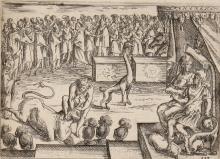Prof. Kim was educated at Brown and Princeton. His PhD dissertation on the reception of Homer in imperial Greek literature eventually led to his book Homer between History and Fiction in Imperial Greek Literature (CUP 2010), which was awarded the Goodwin Award of Merit by the Society for Classical Studies in 2011. He has written articles on the ancient novel, the so-called ‘Asiatic’ style, and Dio of Prusa, among other things, and is now working on a second book on the idea of archaic and anti-classicizing elements in literature of the imperial period. Prof. Kim taught for several years in our department before moving on to the University of Texas at Austin and now teaches at Trinity University in San Antonio.
Here is Prof. Kim's description of his lecture: 'In this talk, I offer a new way of looking at Heliodorus, An Ethiopian Tale 3.14, the famous passage in which the Egyptian priest Calasiris provides a brief account of Homer's Egyptian origins. The links between Homer's biography and those of the novel's main characters have often been observed; I argue that the story takes on an additional and different resonance when read in the context of the longer digression of which it is a part, where Calasiris and his interlocutor Cnemon discuss dreams, allegorical interpretation, divine epiphanies, and Homeric poetry. The hidden truths, false appearances, symbols, and the powers of recognition which so preoccupy Calasiris there also suffuse his account of Homer's life, and by extension the novel as a whole.'
